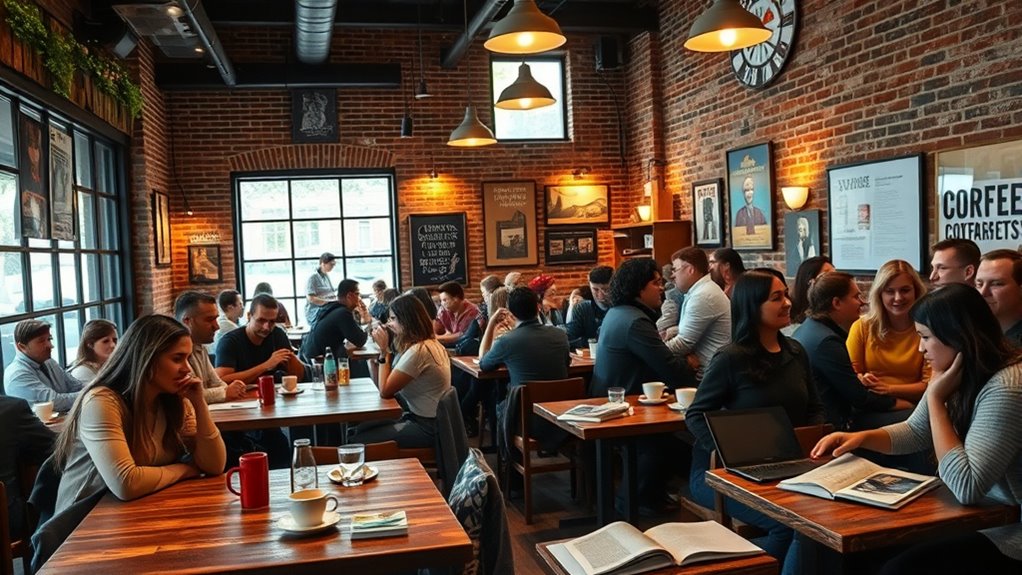The coffeehouse has long been a public sphere where diverse voices exchange ideas and shape social discourse. Today, digital platforms amplify this role, blending face-to-face conversations with online activism. Through social media and online forums, you can participate in global debates, promoting civic engagement and cultural understanding. This evolving space supports democratic dialogue, connecting local and international communities. If you keep exploring, you’ll discover how media theory explains the coffeehouse’s continued importance in society.
Key Takeaways
- Coffeehouses historically fostered open dialogue, evolving into modern digital spaces that support inclusive, participatory communication.
- Media theory views coffeehouses as hybrid public spheres, where face-to-face and digital interactions shape societal discourse.
- They serve as sites for civic engagement, amplifying diverse voices through social media and online platforms.
- Coffeehouses facilitate cultural exchange, promoting social cohesion and intercultural dialogue in a mediated environment.
- Theoretical perspectives highlight their role in influencing societal norms, values, and democratic participation through evolving communication channels.

Coffeehouses have long served as vibrant spaces where people gather to exchange ideas, debate issues, and engage in social discourse. Today, these traditional hubs of conversation have evolved with the digital age, becoming dynamic sites where digital activism flourishes alongside face-to-face interactions. You might find that the physical space of a coffeehouse now blends seamlessly with online platforms, amplifying voices and enabling activism that crosses geographical boundaries. When you participate in digital activism within these spaces, you’re not just sharing a post or signing a petition; you’re engaging in a form of collective action that’s rooted in the social fabric of these venues. Coffeehouses act as catalysts for this digital engagement, providing a familiar, comfortable environment where ideas can be discussed openly and then amplified through social media, blogs, or online forums. This fusion of physical and digital interaction fosters a sense of community and immediacy that wasn’t possible before. As you sit in a coffeehouse, you’re part of a broader cultural exchange that extends beyond local boundaries. These spaces serve as melting pots where diverse perspectives collide and mingle, enriching your understanding of different cultures, beliefs, and social issues. The exchange isn’t limited to spoken words; it often involves sharing digital content, participating in online campaigns, or collaborating on projects that promote social change. In this way, coffeehouses become catalysts for cultural exchange, helping you connect with ideas and people from around the world without leaving your seat. By fostering both digital activism and cultural exchange, coffeehouses support the development of a public sphere that is more inclusive and accessible. You can witness this in how people use these spaces to discuss global issues, organize protests, or share stories that highlight social injustices. These interactions are essential to shaping public opinion and encouraging civic engagement. As media theory suggests, the coffeehouse transforms from a simple gathering place into a hub where communication flows freely—both face-to-face and through digital channels—creating a vibrant, participatory public sphere. In this environment, your voice matters, whether you’re debating with someone across the table or sharing a post online. The coffeehouse’s role as a site of cultural exchange and digital activism underscores its importance in fostering democratic dialogue and social cohesion. It’s where tradition meets innovation, and where your participation helps shape the collective discourse. Ultimately, the coffeehouse remains a crucial social space, continuously adapting to serve as a platform for meaningful interaction, activism, and cultural understanding in an increasingly interconnected world. Additionally, the concept of public sphere helps explain how these spaces facilitate open, inclusive dialogue that shapes societal norms and values.
Frequently Asked Questions
How Do Coffeehouses Influence Political Activism Today?
You can see coffeehouses influence political activism today by serving as spaces for grassroots organizing and boosting civic engagement. You might gather with others to discuss issues, share ideas, or plan protests, making these venues essential for community action. Their informal atmosphere encourages open dialogue, helping you connect with like-minded individuals, mobilize support, and stay informed on political matters, ultimately strengthening democratic participation.
Are Digital Cafes Replacing Traditional Coffeehouse Public Spheres?
Digital cafes are transforming the traditional coffeehouse public sphere into vibrant virtual networking hubs. You find yourself engaging in digital communities where ideas flow freely, much like a lively café. While they offer instant connection and broader reach, they can lack the intimacy and spontaneous dialogue of physical spaces. So, these digital spaces are not replacing but evolving the concept, blending the charm of coffeehouses with the reach of technology.
What Role Do Social Media Play in Modern Coffeehouse Discussions?
Social media plays a significant role in modern coffeehouse discussions by creating online communities and virtual meetups. You can engage with diverse perspectives instantly, share ideas, and debate current issues from anywhere. These platforms facilitate continuous conversations, mimicking the lively atmosphere of traditional coffeehouses. By connecting people globally, social media guarantees that discussions remain vibrant, accessible, and inclusive, transforming the way you participate in public discourse today.
How Inclusive Are Coffeehouse Debates Across Different Social Groups?
You might find coffeehouse debates surprisingly diverse, yet social stratification can still limit participation for some groups. While cultural diversity enriches discussions, barriers like language, socioeconomic status, or social norms often exclude marginalized voices. You’re encouraged to challenge these divides, fostering more inclusive conversations where everyone’s perspective matters, regardless of their background. Bridging these gaps transforms coffeehouses into genuine spaces for everyone to share ideas freely.
Can Coffeehouses Foster Genuine Democratic Participation in the Digital Age?
Yes, coffeehouses can foster genuine democratic participation in the digital age by encouraging cultural exchange and artistic collaboration. You can engage with diverse perspectives, share ideas, and build community through face-to-face conversations and collaborative projects. These spaces promote meaningful dialogue that digital platforms sometimes lack, empowering you to participate actively in democracy while celebrating cultural diversity and creative expression.
Conclusion
So, here’s the irony: your favorite coffeehouse, once a vibrant public sphere for open debate, now often feels more like a quiet retreat from conversation. While media theory celebrates it as a space for free expression, you might find yourself scrolling through social media instead. Ironically, in seeking connection, you could be missing the very public sphere it was meant to foster—replaced by a digital echo chamber. Truly, what’s gained and lost in the modern coffeehouse?









